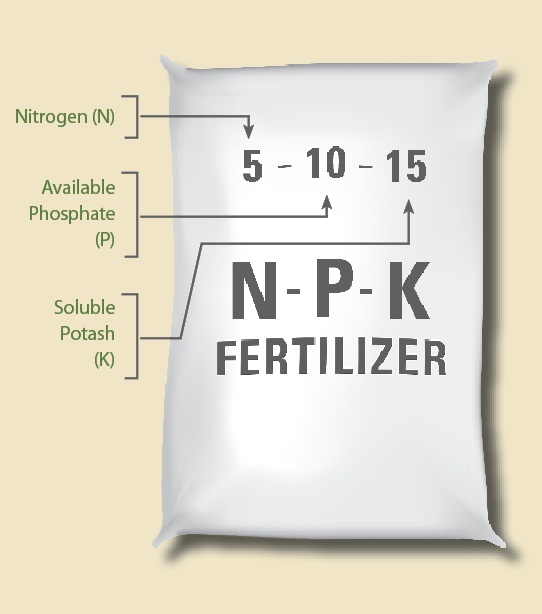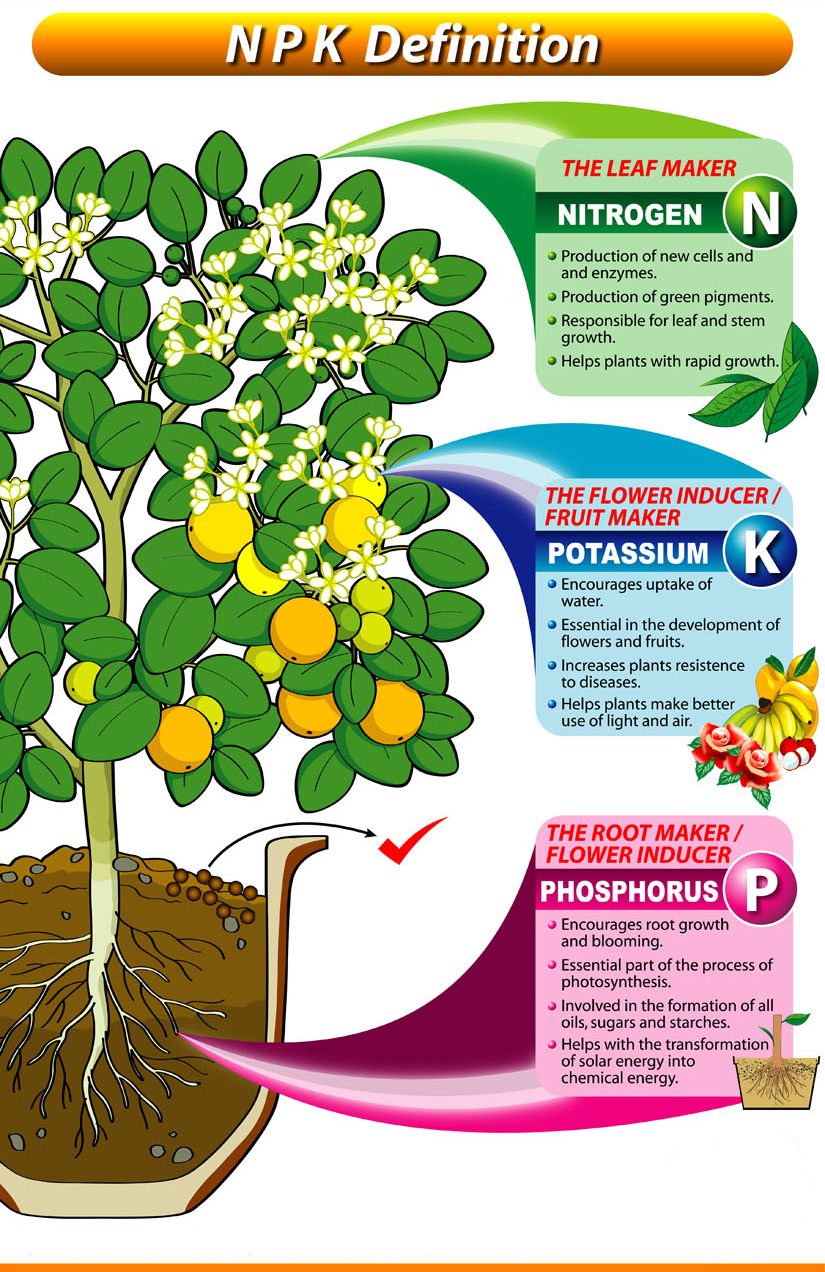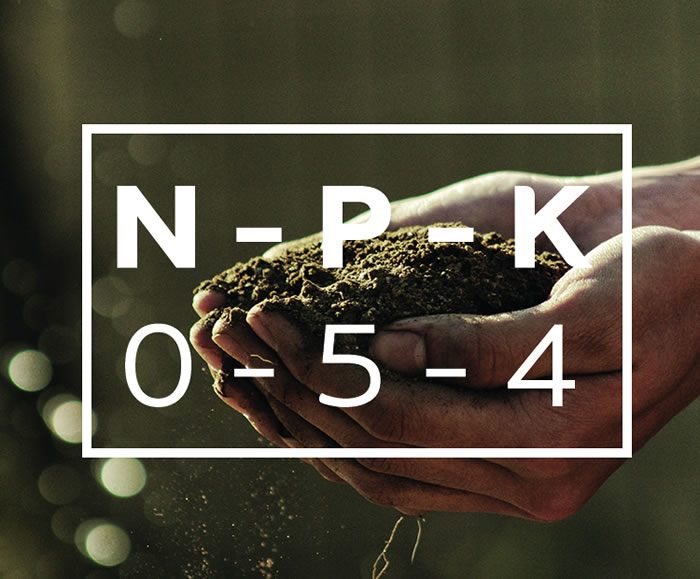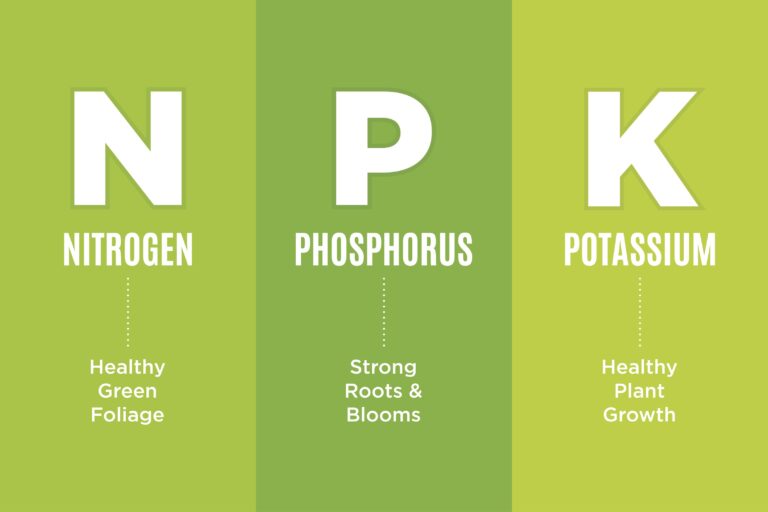
WordPress › Error Plant care houseplant, Fertilizer, Plant information
The letters are element symbols.) The ratio reflects the proportion of three plant nutrients, always in the same order: nitrogen (N), phosphorus (P) and potassium (K). Every fertilizer's N-P-K numbers reflect each nutrient's percentage by weight. For example, the label on a 14-pound bag of Pennington Ultragreen Lawn Fertilizer 30-0-4 shows it.

Peeling Back The NPK Mystery NPK Explained Bonsai Outlet
Those three numbers correlate with the value of the three macro-nutrients used by plants: These macro-nutrients are nitrogen (N), phosphorus (P), and potassium (K), or NPK for short. Understanding the meaning of NPK will help you make the right decision for your plants. The numbers indicate the percentage of these three elements in the fertilizer.

Understanding NPK Fertilizers Grab N' Grow Soil Products
With fertilizers for gardening, you will find the NPK ratio as three numbers on the packaging. The NPK ratio refers to the assigned percentage of nitrogen (N), phosphorus (P), and potassium (K) by weight in a plant food formula. While plants need other nutrients, these are the most important elements to ensure healthy foliage, root, and fruit.

What Is NPK? Growing Exposed
N-P-K Ratio: What Do The Numbers On Fertilizer Mean? Home > News > Resources > N-P-K Ratio: What Do The Numbers On Fertilizer Mean? N-P-K Ratio: What Do The Numbers On Fertilizer Mean? May. 09, 2023 Fertilizer Basics: Organic Fertilizer, NPK Ratio As a founding employee of Gardener's Supply, I wore many different hats over the years.

Use of npk 191919/N.P.K का इस्तमाल कब कहां और कैसे करें/npk effect and side effect/npk 19 19 19
The letters NPK stand for the three main nutrients that plants need to thrive - nitrogen, phosphorus, and potassium. Plants need micronutrients like iron, calcium, and even chlorine, but N, P, and K are the big three. NPK nutrients explained: What do those numbers on the bag mean?
/what-does-npk-mean-for-a-fertilizer-2131094-hero-04-b15bf42055d94374b3ba8ea06763e594.jpg)
What Does NPK Stand for on a Fertilizer Label?
The letters "NPK" on a fertilizer label stand for nitrogen, phosphorus, and potassium, the three primary nutrients plants need to grow. The numbers on the label indicate the ratio (by percentage) of nitrogen, phosphorus, and potassium in the fertilizer container. Even if you do not see the letters N-P-K, but you see a set of three numbers, for.

What is NPK [chart] Garden soil, Cannabis nutrients, Gardening tips
What does NPK mean? The three major nutrients that plants need are nitrogen, phosphorus, and potassium. These are referred to by the initials of their chemical symbols: N (Nitrogen), P (Phosphorus), and K (Potassium). What is NPK fertiliser?

What Does NPK Mean and How to Use It to Grow a Great Garden Just a Homeowner
That is the N-P-K ratio, or the ratio of the three main macronutrients that all plants need to grow: Nitrogen (N), Phosphorus (P), and Potassium (K). Different plant feeds have different ratios of N-P-K because different types of plants need different ratios, and some plants need more of certain nutrients during certain stages of growth.

A Complete Guide to NPK fertilisers what does it mean and what does it do? MOOWY
N-P-K Meaning in Fertilizer. NPK simply represents the three macro-nutrients that are needed for the healthy growth of a plant. They include nitrogen (N), phosphorus (P), and potassium (K) or NPK. It's important to note that the higher the number, the more concentrated the nutrients are in that fertilizer. N-P-K numbers simply reflect.

The Meaning of NPK Plant Nutrition and Deficiencies
The three numbers on fertilizer represents the value of the three macro-nutrients used by plants. These macro-nutrients are nitrogen (N), phosphorus (P) and potassium (K) or NPK for short. The higher the number, the more concentrated the nutrient is in the fertilizer. For example, numbers on fertilizer listed as 20-5-5 has four times more.

Organic Hydroponic Nutrient FAQs
Understanding NPK. The three letters, N, P, and K, correspond with three numbers that indicate the percentage of each nutrient in that particular product. For example, a product marked 10-10-10 contains 10 percent nitrogen, 10 percent phosphorus and 10 percent potassium. A bag marked 20-20-20 containers twice as much of each nutrient.

NPK Fertilizer Meaning Lawn care business, Lawn care business cards, Fertilizer
To get the % K value, multiply the reported NPK value by 0.83. Using this information you can see that a fertilizer NPK number of 10-10-10 contains 10% nitrogen, 4.36% phosphorus, and 8.3% potassium. These conversion numbers will help you determine the correct amount of fertilizer to add to your garden so that you meet the soil test requirements.

What Do The Numbers Mean On Fertilizer? NPK Ratio Explained Garden Crafted
The NPK meaning reflects the three elements found in this fertilizer mixtures— nitrogen, phosphorus, and potassium. The three letters refer to the chemical symbols used to identify these.

knowledge Everchem Fertilizer Company
More precisely, the first number ("N value") is the percentage of elemental nitrogen by weight in the fertilizer; that is, the mass fraction of nitrogen times 100. The second number ("P value") is the percentage by weight of phosphorus pentoxide P 2O 5. The third number ("K value") is the equivalent content of potassium oxide K 2O. [3]

NPK The Science, What They Are and What They Do Lawn Serv
For example, 20-10-10 denotes a fertilizer that is 20 percent N, 10 percent P, and 10 percent K. The higher the number is, the more concentrated that particular nutrient is in the fertilizer. Whether you're fertilizing evergreens , flowers or crops in your kitchen garden , it is important to always apply fertilizer at the recommended rate from the manufacturer as over-application can.

What Is NPK? Explaining Fertilizer Numbers
What is the N-P-K? What are nitrogen, phosphorus, and potassium? Let us take the guesswork out of fertilizing. We'll explain the N-P-K ratio and what those numbers on fertilizers mean. It's all about the soil. Most soil doesn't have all the nutrients needed for optimal growth, which means you won't get the harvest or flower bloom desired.